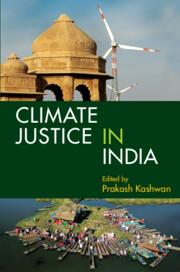Book contents
- Frontmatter
- Contents
- List of Poems and Artworks
- List of Tables
- List of Figures
- List of Abbreviations
- Preface and Acknowledgements
- 1 Introduction: Climate Justice in India
- 2 Urban Climate Justice in India
- 3 How Just and Democratic Is India’s Solar Energy Transition?: An Analysis of State Solar Policies in India
- 4 Extractive Regimes in the Coal Heartlands of India: Difficult Questions for a Just Energy Transition
- 5 Climate Justice Implications of the Relationship between Economic Inequality and Carbon Emissions in India
- 6 Climate Action Plans and Justice in India
- 7 Social Mobilizations for Climate Action and Climate Justice in India
- 8 Reimagining Climate Justice as Caste Justice
- 9 Intersectional Water Justice in India: At the Confluence of Gender, Caste, and Climate Change
- 10 Realizing Climate Justice through Agroecology and Women’s Collective Land Rights
- 11 Conclusion: Pathways to Policies and Praxis of Climate Justice in India
- About the Editor and Contributors
- About the Poets and Artists
- Index
1 - Introduction: Climate Justice in India
Published online by Cambridge University Press: 03 November 2022
- Frontmatter
- Contents
- List of Poems and Artworks
- List of Tables
- List of Figures
- List of Abbreviations
- Preface and Acknowledgements
- 1 Introduction: Climate Justice in India
- 2 Urban Climate Justice in India
- 3 How Just and Democratic Is India’s Solar Energy Transition?: An Analysis of State Solar Policies in India
- 4 Extractive Regimes in the Coal Heartlands of India: Difficult Questions for a Just Energy Transition
- 5 Climate Justice Implications of the Relationship between Economic Inequality and Carbon Emissions in India
- 6 Climate Action Plans and Justice in India
- 7 Social Mobilizations for Climate Action and Climate Justice in India
- 8 Reimagining Climate Justice as Caste Justice
- 9 Intersectional Water Justice in India: At the Confluence of Gender, Caste, and Climate Change
- 10 Realizing Climate Justice through Agroecology and Women’s Collective Land Rights
- 11 Conclusion: Pathways to Policies and Praxis of Climate Justice in India
- About the Editor and Contributors
- About the Poets and Artists
- Index
Summary
Arundhati Roy famously described the COVID-19 pandemic as a
portal, a gateway between one world and the next. We can choose to walk through it, dragging the carcasses of our prejudice and hatred, our avarice, our data banks and dead ideas, our dead rivers and smoky skies behind us. Or we can walk through lightly, with little luggage, ready to imagine another world. And ready to fight for it. (Roy 2020)
As inspiring and insightful as these words are, such juxtaposition of utopia and dystopia barely scratches the surface of what and who we are as a nation. The soulcrushing images of burning pyres in parking lots turned into makeshift graveyards, which international and national media have immortalized, offer a clue, as does the sombre poetry of Parul Khakhar (Tripathi 2021). India is a land pockmarked with a million fires.
The COVID-19 crisis has come as a shock to many middle-class Indians. Yet, to India's Dalits, Adivasis, women, and other marginalized groups, haunted by centuries of oppression, this crisis is yet another in a long list of historical and ongoing crises. For example, the coalfields of Jharia in Jharkhand have been burning for over a century now. As a result, at least 130,000 families have, quite literally, lived through a century-long trial by fire (Rahi 2019). Since 1995, the state-owned Bharat Coking Coal Limited (BCCL) has claimed to have a ‘master plan’, which is possibly gathering dust in some almirah of the coal ministry (S. Kumar 2021). One would imagine that a pandemic like COVID-19 might scare the minister whose job includes ensuring the welfare of the 3.6 million people who work in mines with a less than adequate supply of fresh air. Yet, in 2020, India's coal minister valorized coal workers as ‘our coal warriors who are toiling day and night to keep the lights on even during the corona pandemic’ (Press Information Bureau 2020). They toiled very hard indeed.
A year later, as India struggled to confront the monstrous second wave of the pandemic, Central Coalfields Limited (CCL), a subsidiary of Coal India Limited (CIL), recorded the highest-ever single-day coal dispatch of 80 railway rakes (PNS 2021).
- Type
- Chapter
- Information
- Climate Justice in India , pp. 1 - 24Publisher: Cambridge University PressPrint publication year: 2025
- Creative Commons
- This content is Open Access and distributed under the terms of the Creative Commons Attribution licence CC-BY-NC 4.0 https://creativecommons.org/cclicenses/

